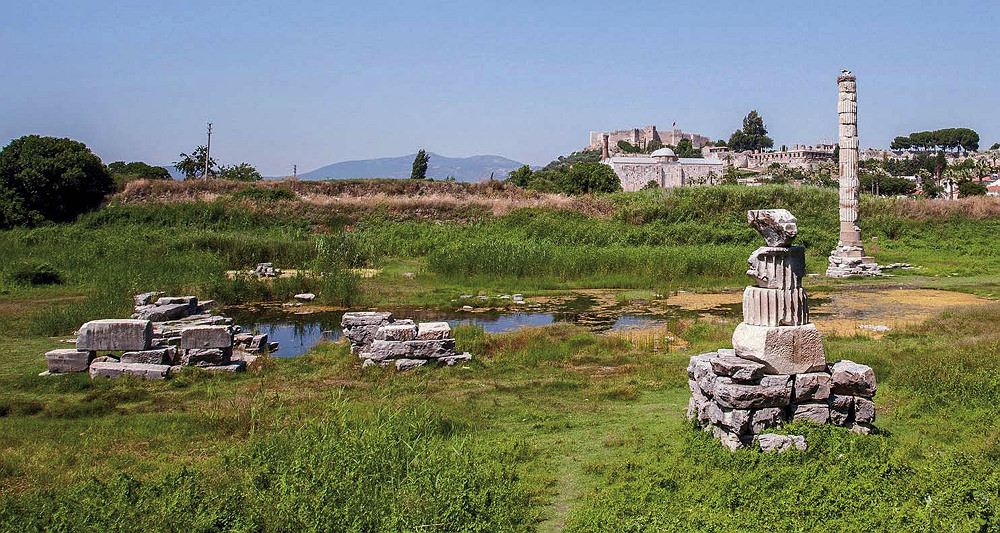Theon, a would-be critic: Callimachus! It’s not often we run into you outside the Library. Have you come to see the victory procession of our benefactor, King Ptolemy? We all enjoyed that Hymn to Zeus you wrote about him. “Who should we sing but the ultimate god king, bringer of justice to the children of Heaven.” Isn’t that how it goes? Or are you off to meet a boy in town, the muse for one of those cute but cutting epigrams you’re known for? Or are you just randomly collecting notes for that magnum opus of yours? The Complete Storybook Collection—wasn’t that what you said it was called?
Callimachus: Delightful to see you. Are you still looking for work? I do love our new Library—it’s really my favorite place. Some people think I’m the head librarian, which is flattering but wrong. I’m happy with my own employment there, the more so for the contrast to my birthplace in Libya. Alexandria suits me, because we get news, and scrolls, from all over the Greek-speaking world: I can live here and write about gods and traditions from all over.
As for your questions, I’ll take those in order. Yes I am. Not quite. If I were I wouldn’t tell you, but you can assume there’s at least one; also, please cool it with the bisexual erasure—I like girls and guys! And I’m glad you like those epigrams, though hymns and epigrams are only two among the kinds of poems I write. And I fancy that when I complete that set of poems about local tales and myths and explanations—Aetia, “origins,” like superhero origin stories—that’s going to be an even bigger hit than my collection of epigrams was.
Thanks for your words about the Hymn to Zeus, too. It’s a poem about how rulers ought to be, not necessarily how they all are.
Theon: I do see some great opportunities for editorial positions here, although I have to admit I haven’t received a full-time offer yet. Perhaps you could write me a letter of recommendation? Word has it you got your rival Apollonius sent to a tiny island somewhere. And I don’t mean Delos. Actually, didn’t you go to Delos when you were working on your Hymn to Delos? How was it there?

Ruins of the Temple of Artemis at Ephesus, a wonder of the ancient world. Callimachus honored the goddess with a hymn and shorter poems as well.
Photgraph by Murat Tegmen/Alamy Stock Photo
But you say you write more than two kinds of poems. That was unheard of in the glory days of Athens. Surely you remember what Plato says about poetry being inspiration, not labor? Doesn’t a god tell you what to do? Isn’t that how poets compose? Or is it because your Aetia is all facts, no fiction? Out with the old, in with the older…
Callimachus: A lot of my friends are waiting on full-time offers these days. Before I can agree to support your work I’ll have to write a snarky epigram about it, though. Are you OK with that? I mean, I get that kind of question a lot. It’s not really a question so much as a comet, by which I mean it’s a bad omen all around and draws attention to itself.
I may have gone to Delos, or I may have done really good library research. Smart girls never tell. Wait: not “or”; “and.” I always do my research.
As for Apollonius, we mock each other but we get along. He and I differ a lot about how the best poets work these days, and by “best” I mean “not him.” He’s very old-school and prefers to imitate Homer, which I view as setting yourself up for failure; why not take advantage of the wealth of information we have now and make short or easily segmented, beautiful intricate things rather than unwieldly long ones?
But I’d never get him sent to Rhodes just because his poems are too long (though, granted, they are too long). That would be a jerk move. Don’t people call him “of Rhodes” because his father came from there? He’s Alexandrian. Like me. (Some people call me “Callimachus of Cyrene.” Which is in Libya.)
Oh, and thanks for asking about inspiration (headdesk! headdesk!). I won’t deny it exists, but Apollo favors the prepared mind. There may be poets who composed the way Ion composes in Plato’s dialogue—inspired, with no knowledge that’s truly his own—but I haven’t met them, and they may all have died out. You know what knowledge truly belongs to poets? Knowledge about the techniques and the history of poetry. (Which, by the way, Apollonius does have. But he’s fun to tease.)
Theon: Speaking of history, you must have been thinking about the future of poetry too. I mean, there’s a lot going on here right now: you, Apollonius, Theocritus—whatever it is he thinks he is doing with those shepherds of his. Imagine a poet looking back at this place from the future. What do you think she would make of it? I mean literally, do you think they will take the stories apart and retell them, or is the magic more at the level of style?
Callimachus: You’re assuming that future poets will read the stories as wholes before they take those stories apart. I’m not sure that’s a safe assumption. If I had to guess, or bet, I’d bet that they’ll get all of Homer, but only bits and bobs of much else, with a full collection here and there, and they’re going to start out confused. If we’re lucky some scholars will try to put it all back together in a sensible, entertaining, knowing way, sort of the way I’m doing with the Aetia, which collects tales from all over, and some poets (maybe they’ll also be scholars; who knows?) will invent new styles to make new wholes.
We’re already doing that sort of thing with Egyptian myths, right? When we find one that fits the divinities and the stories of our Greek-speaking world, we recast it. When we find one that’s completely alien to us, we leave it alone.
I hope that when future readers get my advice, and the advice I convey from gods and heroes and the like, those future readers will be able to tell when I’m being serious and when I’m making fun of someone. Then again, sometimes I’m not sure myself. I have to rely on my sources. They will, too.
I’m afraid I’m getting away from your lovely question. I’d like to conclude by stating overtly what my friends already know implicitly: style is everything.
Theon: Style, yes, that reminds me: the word for “style” is derived from the word for a pen or other writing instrument. How about that for an origin story! It makes me want to get back to my dictionaries. So I think I will do that. It was nice running into you, and I’ll be in touch about that letter.









